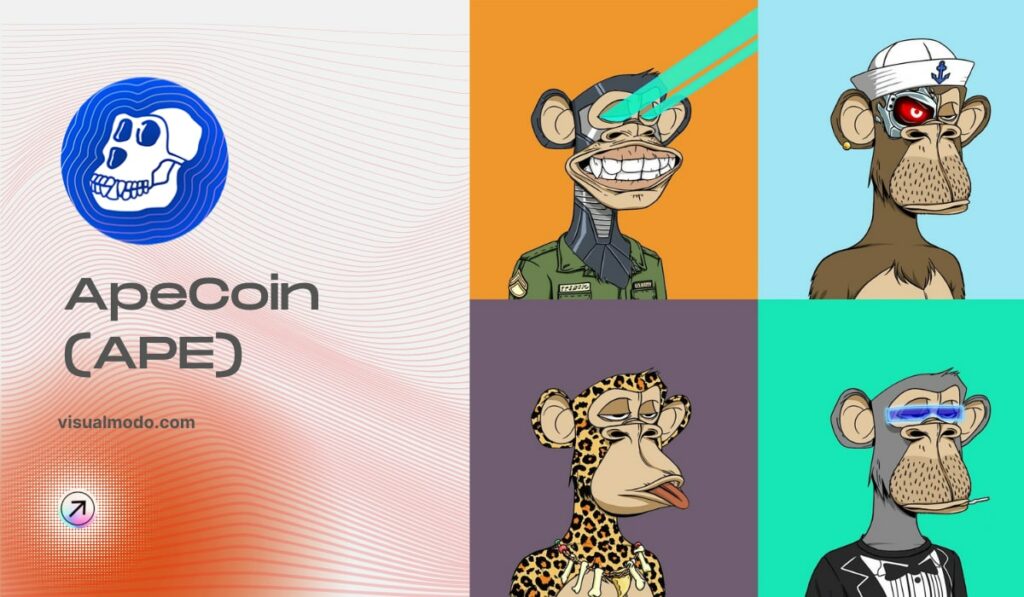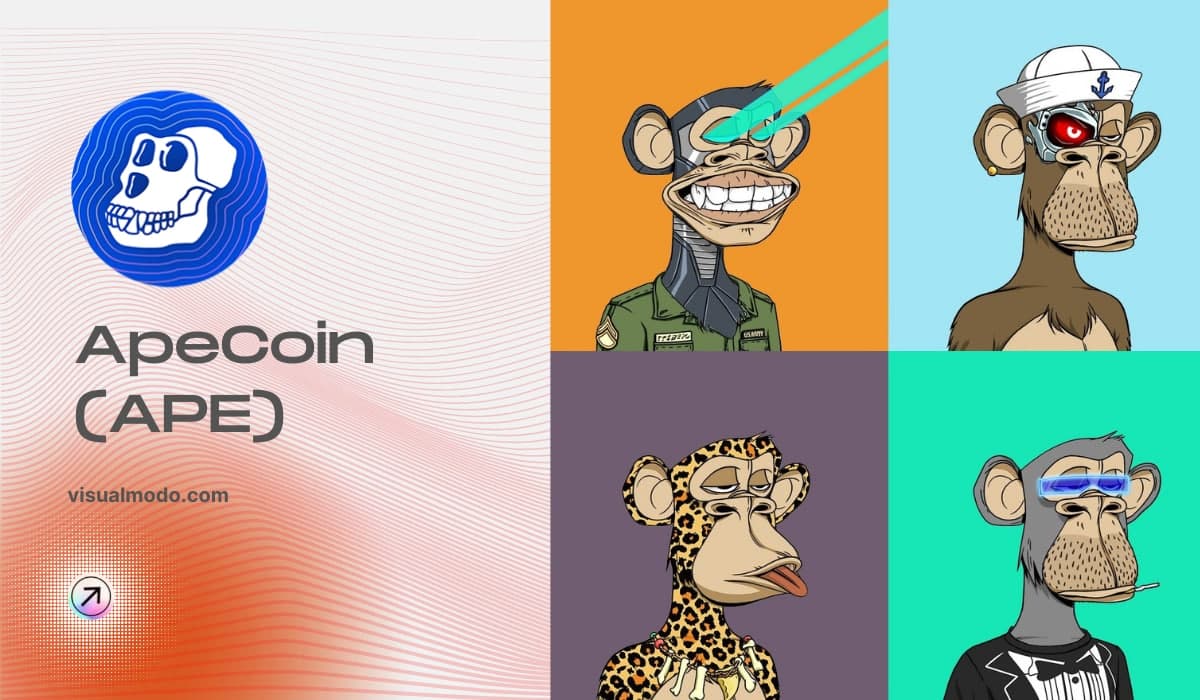The recent news declared that ApeCoin, a new cryptocurrency, would be available to owners of NFTs from the Bored Ape Yacht Club collection.

Notice the passive voice? It intentionally connects ApeCoin to these highly-priced non-fungible tokens and, by extension, to Yuga Labs, the organization behind Bored Apes. However, a carefully orchestrated marketing strategy has gone to great lengths to distance ApeCoin from any traditional corporate entity.
Instead, the messaging emphasizes ApeCoin’s origination from the ApeCoin DAO, a novel organizational structure governed entirely by token holders. Possessing APE grants membership in the DAO (short for Decentralized Autonomous Organization, a type of cryptocurrency-based online collective); ownership of a Bored Ape NFT isn’t even required for participation.
The official ApeCoin website describes the token as “a decentralized protocol layer for community-led initiatives that push culture into the metaverse.”
Let’s break down this complex concept, shall we?
ApeCoin: What is it?
ApeCoin is an ERC-20 token, a specific cryptocurrency type built upon the Ethereum (ETH) blockchain. This framework has been used to develop a majority of tokens on Ethereum, such as the FWB token for the “Friends with Benefits” social club and WRITE from Mirror’s Web 3 crowdfunding platform.
Unlike NFTs, these tokens are “fungible” (similar to Bitcoin BTC), meaning each ApeCoin holds the exact same value as any other. These tokens can be traded on decentralized exchanges, allowing users to exchange cryptocurrencies without intermediaries.
Remarkably, almost all major centralized exchanges listed the token immediately upon its release. This achievement is notable considering the rigorous listing processes of key players like Coinbase.
Within a single day of trading, ApeCoin achieved a market capitalization of nearly $2 billion. Currently, one APE is valued around $10, with a total supply capped at one billion tokens (not all are currently circulating).
The Team Behind ApeCoin
According to ApeCoin’s website and associated press releases, the ApeCoin DAO, a new governing body comprising all APE holders, is spearheading the launch. This membership grants the ability to submit and vote on community proposals.
Similar governance structures have emerged from other NFT projects. For instance, purchasing an NFT from the Nouns collection grants you member within the Nouns DAO, an online investment collective boasting a $62 million treasury. Noun owners collectively decide the treasury’s use, often proposing ideas like creating NFT comic books.
An independent entity, The Foundation, manages the ApeCoin DAO’s daily operations, including proposal handling, ensuring that ideas receive adequate support from the DAO community for realization. It’s worth noting that legally, this constitutes support for the ApeCoin DAO, not ApeCoin itself.
An Ape Foundation subcommittee acts as the ApeCoin DAO’s “board,” overseeing specific proposals.
The initial board consists of five prominent cryptocurrency investors: Reddit co-founder Alexis Ohanian; Amy Wu, head of venture capital at FTX cryptocurrency exchange; Maaria Bajwa from Sound Ventures; Yat Siu of Animoca Brands; and Dean Steinbeck from Horizon Labs.
Each member serves a six-month term, with the ApeCoin website promising DAO members the right to vote on future members.
Adding another layer, Cartan Group, a Cayman Islands-based consulting firm, plays a role. They are contracted for six months at $150,000 per month, with co-founder Brian Tang having published all five proposals.
Decoding the ApeCoin Protocol
The ApeCoin ecosystem includes the ApeCoin protocol (the technology behind the ApeCoin token), the ApeCoin DAO, the Ape Foundation, and the ApeCoin DAO board.
However, the ApeCoin token isn’t developed by the Bored Ape investor community. This is where things get murky. Who is the actual creator?
Yuga Labs, a traditional corporation registered in Delaware, USA, is the company behind the Bored Ape Yacht Club series. Currently in talks for a $5 billion investment with Andreessen Horowitz, Yuga Labs aims to become the first major NFT monopoly, having already taken steps in that direction.
Yuga Labs is also responsible for all significant projects and acquisitions related to the Bored Ape Yacht Club family. Utilizing the collection’s intellectual property requires going through them.
Nicole Muniz, a Yuga Labs representative, explained their internal process: new ideas are passed from her to the community lead, then to the product and engineering teams.
She revealed that the company has gifted a one-time special NFT to the ApeCoin DAO treasury and plans to “adopt ApeCoin as the primary token for all new products and services.” This directly links the asset’s value to the overall success of the Bored Ape collection.
Despite this, Yuga Labs maintains they are not responsible for the ApeCoin token.
Further muddying the waters, Strange Brew Strategies, another entity associated with Yuga Labs, cautioned journalists that while it’s tempting to simplify and say ApeCoin is from the Bored Ape Yacht Club, “that’s not accurate.”
Distribution and “Free Money”
Adding further complexity is ApeCoin’s distribution model.
Token holders and the DAO treasury hold 62% of all ApeCoins. During ApeCoin’s initial 90 days, anyone possessing NFTs from the Bored Ape Yacht Club or its two derivative collections – the Mutant Ape Yacht Club and the Bored Ape Kennel Club – can claim a set amount of APE on the ApeCoin website.
Since APE has a tangible value and is traded on major exchanges, claiming these coins is essentially receiving free money. Owning a Bored Ape entitles you to 10,094 APE, roughly $100,000 based on Monday’s valuation. This equates to about a third of the price of another Bored Ape.
110 Million APE Tokens Claimed (and Counting)
Data from a Dune Analytics dashboard reveals that approximately 110 million APE tokens have been claimed by NFT holders.
The remaining 38% of ApeCoin is allocated to “early contributors” and the Jane Goodall Legacy Foundation, an organization dedicated to protecting real-life jungle primates.
Yuga Labs is receiving 150 million APE, with 10 million (or an equivalent amount) designated for the Jane Goodall Legacy Foundation. The remaining 140 million APE will go to “the companies and people who helped make this project a reality.” This group, likely including Yuga Labs team members, remains unnamed.
Yuga Labs founders will receive another 80 million APE. These coins are “locked up” for the first 12 months, preventing immediate profit-taking.
The concept of NFTs granting free tokens isn’t new. In September, developers introduced Adventure Gold (AGLD), a cryptocurrency linked to the rising NFT collection Loot.
Automatic AGLD distribution to NFT holders resulted in effortless profits of tens of thousands of dollars for those who claimed their tokens. This illustrates how NFTs can function as a means to generate wealth.
Again, Yuga Labs claims no responsibility for ApeCoin, despite receiving a substantial share of the profits.
Legal Gray Areas
Whether this initiative complies with regulations hinges on the ApeCoin DAO’s independence from Yuga Labs. If Yuga Labs directly issued a token as a reward for Bored Ape holders, it could be argued that Bored Apes are investments subject to securities regulations.
Similar to how certain stocks pay dividends, the value of these NFTs would be partially tied to potential benefits.
However, since ApeCoin originates from the ApeCoin DAO and not Yuga Labs, it creates a semblance of legality under US law. This is because an independent entity, rather than the company itself, is allocating tokens to the company and its founders.
Traditional companies navigate this through regulated initial public offerings (IPOs). ApeCoin’s distribution remains largely unregulated because the US Securities and Exchange Commission (SEC) hasn’t yet exerted oversight on NFTs. However, this may change.
Rohan Gray Weighs In
Rohan Gray, a Willamette University law professor specializing in cryptocurrency regulation, suggests the distinction between ApeCoin DAO and Yuga Labs might also relate to the “Hinman test.”
Named after a former SEC employee now at Andreessen Horowitz, the test argues that decentralized autonomous organizations (DAOs) are exempt from registering tokens as securities. ApeCoin DAO operates decentrally (at least nominally), while Yuga Labs does not.
Gray states, “It’s the crypto world’s next attempt to circumvent securities regulation. First, it was the initial coin offerings. But they (the crypto community) couldn’t do that after the [SEC’s] 2017 ICO report, so they switched to stable coins. There was a crackdown on that, and then they turn to the NFTs.”
He views ApeCoin as the cryptocurrency industry’s attempt “to almost restart the 2017 debate (surrounding ICOs).”
ApeCoin’s Utility: Beyond Speculation
Currently, ApeCoin primarily functions as a vehicle for DAO speculation and “governance.” However, Yuga Labs has ambitious plans for the token.
For instance, the mobile game Benji Bananas, developed by Animoca Brands (whose co-founder Yat Siu sits on the Ape Foundation board), utilizes ApeCoin as in-game currency. Players can purchase a “Benji Bananas Membership Pass” for 25 ApeCoins, earning “Special Tokens” redeemable for ApeCoins.
This is likely just the beginning of a vast ApeCoin-powered ecosystem, with Yuga Labs intending to use APE as currency across all new projects. This strategy also strengthens their legal position – expanding the token’s utility beyond speculation increases its chances of avoiding SEC scrutiny.
If the price remains stable and traders outside the Bored Ape Yacht Club ecosystem invest in APE, its use cases are bound to multiply.
